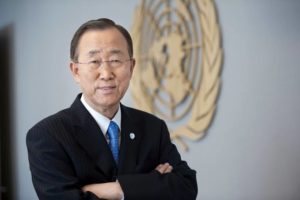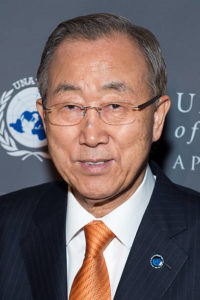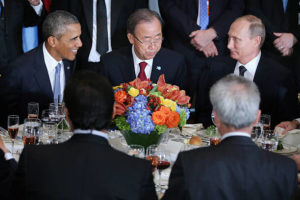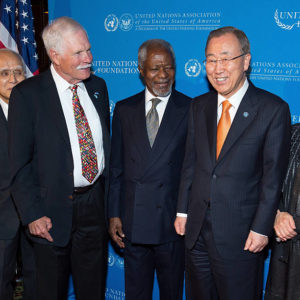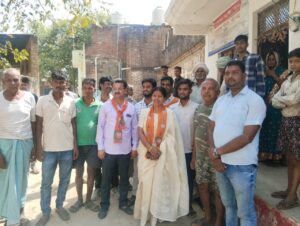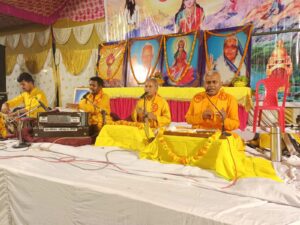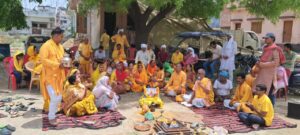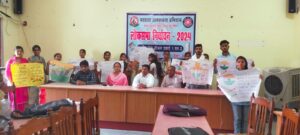The Great human being Ban ki-Moon Biography
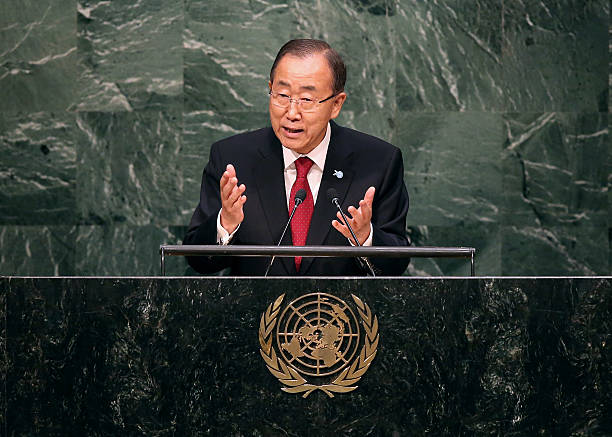
NEW YORK, NY - SEPTEMBER 28: United Nations Secretary General Ban Ki-moon delivers opening remarks at the United Nations General Assembly at U.N. headquarters on September 28, 2015 in New York City. The ongoing war in Syria and the refugee crisis it has spawned are playing a backdrop to this year's 70th annual General Assembly meeting of global leaders. (Photo by John Moore/Getty Images)
Ban Ki-Moon
(born June 13, 1944, Ŭmsŏng, Japanese-occupied Korea [now in South Korea] ), South Korean diplomat and politician, who served as the eighth secretary-general (2007–1
At age 18 Ban won a competition that took him to the White House to meet U.S. Pres. John F. Kennedy, a visit that Ban claimed inspired his public career. He received a bachelor’s degree (1970) in international relations from Seoul National University and earned a master’s degree (1985) from the John F. Kennedy School of Government at Harvard University. After entering South Korea’s foreign service in 1970, he served as counselor to the embassy in Washington, D.C. (1987–90), director of American affairs at the Foreign Ministry (1990–92), deputy foreign minister (1995–96), and national security adviser to the president (1996–98). Following a stint as ambassador to Austria (1998–2000), Ban returned to Seoul as vice-minister of foreign affairs (2000–01). In 2003 he became foreign policy adviser to the new president, Roh Moo Hyun. As minister of foreign affairs and trade from 2004 to 2006, Ban played a key role in the six-party talks aimed at denuclearizing North Korea.
Ban’s UN experience began in 1975 when he became a staff member of the UN division of the Foreign Ministry in Seoul. In the late 1970s, when South Korea had only observer status, Ban was posted to the South Korean mission to the UN. In 1999 he served as chairman of the preparatory commission for the Comprehensive Nuclear Test Ban Treaty Organization. Ban also led the cabinet of the president of the UN General Assembly during South Korea’s tenure of the rotating presidency in 2001–02, the critical period following the terrorist attacks in the United States on September 11, 2001 (see September 11 attacks)
On October 13, 2006, just days after North Korea tested a nuclear weapon, Ban was named UN secretary-general-elect. Though Ban’s quiet demeanour led some observers to question his ability to take on the daunting challenges facing the UN, others characterized him as an astute consensus builder who would be able to work effectively with both the Americans and the Chinese. Ban succeeded Kofi Annan on January 1, 2007, becoming the first Asian to serve as UN secretary-general since Burmese statesman U Thant held the office (1962–71). Ban faced a number of challenges, including the North Korean and Iranian nuclear threats, troubles in the Middle East, and the humanitarian crisis in the Darfur region of Sudan. Reform of the UN itself was also a major issue. In 2011 Ban was elected to a second term.
On this World Population Day, I call on all with influence to prioritize youth in development plans, strengthen partnerships with youth-led organizations, and involve young people in all decisions that affect them. By empowering today’s youth, we will lay the groundwork for a more sustainable future for generations to come.


